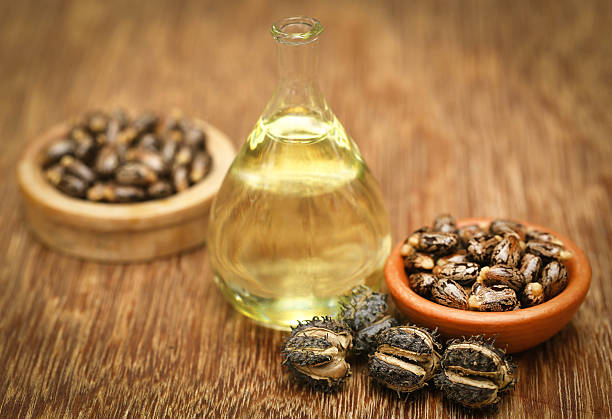In a world increasingly drawn to natural remedies and holistic well-being, castor oil stands as a remarkable and revered elixir. Often referred to as “liquid gold,” this extraordinary oil, derived from the seeds of the castor plant (Ricinus communis), has a history that spans thousands of years, transcending cultures and geographies. It has played a pivotal role in traditional medicine and cosmetics, earning its place as a versatile and cherished natural remedy. In this comprehensive exploration of castor oil, we will uncover its origins, delve into its unique composition, and explore its wide-ranging uses. By the end, you will not only understand the science behind its effectiveness but also appreciate its myriad applications for health, beauty, and overall well-being.
The Origins of Castor Oil:
Castor oil boasts a rich history that traces its roots back to antiquity. Believed to have originated in East Africa, it has since traversed the globe, becoming a staple in various traditional healing practices. Ancient civilizations, including the Egyptians, Greeks, and Romans, held castor oil in high regard for its medicinal and therapeutic properties. Today, its relevance and popularity endure, as it continues to enrich the lives of individuals seeking natural remedies.
The Composition of Castor Oil:
At the heart of castor oil’s efficacy lies its unique composition. This exceptional oil is predominantly composed of ricinoleic acid, constituting approximately 90% of its content. Ricinoleic acid is the linchpin behind many of castor oil’s therapeutic virtues. In addition to this key component, castor oil also contains:
Oleic Acid: This monounsaturated fatty acid contributes to the oil’s moisturizing properties, making it a potent ingredient for skin and hair care.
Linoleic Acid: An essential polyunsaturated fatty acid, linoleic acid plays a crucial role in maintaining skin health and moisture.
Palmitic Acid and Stearic Acid: Saturated fatty acids like palmitic and stearic acid add to the oil’s stability and texture.
Vitamins: Castor oil contains vitamins A and E, renowned for their antioxidant properties, which promote skin rejuvenation and overall health.
Minerals: The oil is also enriched with various minerals, further enhancing its therapeutic potential.
Antioxidants: Antioxidants found in castor oil help combat free radicals, making it a valuable tool in the pursuit of youthful, radiant skin.
Uses of Castor oil
Castor oil is a versatile and multipurpose natural remedy with a wide range of uses for health, beauty, and wellness. Here are some of the most common and effective uses of castor oil:
- Hair Growth and Care

Promotes Hair Growth: Massaging castor oil into the scalp can stimulate hair follicles, leading to thicker and healthier hair growth.
Strengthens Hair: Applying castor oil to the hair shafts can strengthen them, reducing breakage and promoting overall hair health.
Controls Dandruff: Castor oil’s moisturising properties can help combat dandruff and soothe dry scalp.
- Skin Care:
Moisturizes Skin: Castor oil is an excellent natural moisturiser, making it effective for dry, flaky skin.
Acne Treatment: Its anti-inflammatory and antimicrobial properties can reduce acne and skin blemishes.
Anti-Aging: Castor oil contains antioxidants that fight free radicals, helping to maintain youthful and radiant skin.
- Digestive Health:
Laxative: When ingested in small quantities, castor oil can relieve constipation by stimulating the intestines. It should be used with caution and under the guidance of a healthcare professional.
- Pain Relief:
Joint and Muscle Pain: Topical application of castor oil can alleviate sore muscles and joint pain, making it valuable for athletes and those with physical discomfort.
Menstrual Cramps: Applying a warm castor oil pack to the abdomen can ease menstrual cramps.
- Immune Support:
Lymphatic Health: Castor oil packs placed over the lymph nodes can enhance lymphatic circulation, which plays a role in supporting the immune system’s function.
- Eye Health:
Eyelash and Eyebrow Growth: Applying castor oil to eyelashes and eyebrows may promote thicker and longer growth, enhancing the eyes’ natural beauty.
- Nail Health:
Strengthens Nails: Massaging castor oil into the nails and cuticles can help strengthen brittle nails and promote healthier nail growth.
- Wound Healing:
Minor Cuts and Scrapes: Castor oil’s antimicrobial properties can aid in the healing of minor cuts and scrapes. Clean the wound, apply a small amount of castor oil, and cover it with a bandage.
- Fungal Infections:
Ringworm and Athlete’s Foot: Castor oil’s antifungal properties may help alleviate symptoms of fungal infections. Apply a small amount to the affected area.
- Constipation in Livestock:
– Castor oil is sometimes used as a natural remedy for constipation in animals, particularly livestock like horses and cows. However, it should only be administered under veterinary guidance.
- Industrial and Commercial Applications:
– Castor oil is also used in various industrial and commercial applications, including the production of lubricants, coatings, cosmetics, and biofuels.
It’s essential to note that while castor oil offers numerous benefits, individual responses may vary, and it may not be suitable for everyone or every condition. Always perform a patch test when using castor oil topically to check for allergies or sensitivities. Additionally, when using castor oil for medicinal or internal purposes, it’s advisable to consult with a healthcare professional or veterinarian for proper guidance and dosage recommendations.
How to use Castor Oil?

- Hair and Scalp Treatment:
Hair Growth: To promote hair growth and thickness, massage castor oil into your scalp and through your hair. Leave it on for at least 30 minutes, or overnight for a deep treatment, before shampooing and conditioning as usual. Do this regularly for best results.
Strengthening: To strengthen your hair and prevent breakage, apply castor oil to the length of your hair, concentrating on the tips. Leave it on for a few hours before washing it out.
- Skin Moisturizer:
Face: Apply a small amount of castor oil to your face as a natural moisturizer. It’s best to do this at night, as castor oil can be quite thick. Massage it into your skin and leave it on overnight. Be sure to rinse it off in the morning.
Body: For dry or rough skin, you can use castor oil as a body moisturizer. Apply it to damp skin after a shower or bath for better absorption.
- Acne and Blemish Treatment:
Spot Treatment: Dab a small amount of castor oil directly onto acne-prone areas or blemishes. The antimicrobial and anti-inflammatory properties can help reduce inflammation and promote healing.
- Wrinkle Prevention:
Anti-Aging Serum: Mix a few drops of castor oil with a carrier oil (like jojoba or argan oil) and use it as an anti-aging serum. Apply it to your face before bed to help combat the signs of aging.
- Laxative (Oral Use):
Constipation Relief: Consult with a healthcare professional before using castor oil as a laxative. When used for this purpose, it should be taken orally in small quantities (usually a teaspoon or two). It works as a mild, natural laxative and should be used sparingly and with caution.
- Joint and Muscle Pain Relief:
Massage Oil: Use castor oil as a massage oil for sore muscles and joints. Gently warm the oil and massage it into the affected areas. This can provide relief from pain and discomfort.
- Menstrual Cramp Relief:
Castor Oil Pack: Soak a piece of cloth (like a flannel or cotton pad) in castor oil and place it on your lower abdomen. Cover it with plastic wrap and apply a heating pad or hot water bottle for about 30-60 minutes. This can help alleviate menstrual cramps.
- Eyelash and Eyebrow Growth:
Eyelashes and Eyebrows: Use a clean mascara wand or a cotton swab to apply a small amount of castor oil to your eyelashes and eyebrows before bedtime. Be cautious not to get it in your eyes.
- Skin Conditions:
Minor Skin Conditions: Apply castor oil to minor skin conditions like cuts, scrapes, and abrasions. Its antimicrobial properties can help in the healing process.
When using castor oil, it’s essential to choose high-quality, cold-pressed, and organic castor oil for the best results. Always perform a patch test on a small area of skin to check for allergies or sensitivities, especially if you haven’t used castor oil before. Additionally, be mindful that castor oil is thick and can be difficult to wash out, so it’s best to use it in moderation and follow up with regular shampoo or cleansing. Lastly, consult with a healthcare professional before using castor oil internally or if you have any specific health concerns.
Debunk Castor Oil Myth
Castor oil is a versatile natural remedy with numerous benefits, but it has also been associated with certain myths and misconceptions over the years. Let’s debunk some of the common myths surrounding castor oil:
- Myth: Castor Oil Induces Labor:
Debunked: Castor oil has been wrongly believed to induce labor in pregnant women. While it may lead to uterine contractions, its use during pregnancy is not recommended without medical supervision. In fact, it can cause gastrointestinal discomfort and diarrhea, which can be harmful during pregnancy.
- Myth: Castor Oil Cures All Skin Conditions:
Debunked: Castor oil is not a universal remedy for all skin conditions. While it can help with moisturizing and addressing specific issues like acne, dry skin, and minor irritations, it may not be effective for severe or chronic skin conditions like psoriasis or eczema.
- Myth: Castor Oil Grows Hair Overnight:
Debunked: Castor oil can promote hair growth, but it’s not a magical solution that will make your hair grow overnight. It takes time and consistent use to see noticeable results. Be patient and incorporate it into your regular hair care routine for best results.
- Myth: Castor Oil is Safe for Internal Use in Large Quantities:
Debunked: While castor oil is safe for oral use in small quantities as a laxative, consuming large amounts can lead to severe diarrhea, dehydration, and electrolyte imbalances. It should only be taken orally under the guidance of a healthcare professional.
- Myth: Castor Oil “Detoxifies” the Body:
Debunked: Claims that castor oil detoxifies the body by removing toxins are not supported by scientific evidence. The concept of “detoxing” the body through castor oil is a misconception. Castor oil primarily has topical and digestive uses.
- Myth: Castor Oil Thins the Blood:
Debunked: Castor oil does not have blood-thinning properties. While it may have a mild effect on blood circulation when applied topically, it does not significantly impact blood viscosity or clotting.
- Myth: Castor Oil Eliminates Wrinkles Instantly:
Debunked: Castor oil can help moisturize and nourish the skin, reducing the appearance of fine lines and wrinkles over time. However, it does not produce instant or miraculous results. Consistent use is key for noticeable improvements.
- Myth: Castor Oil Can Replace All Other Skincare Products:
Debunked: Castor oil is a valuable addition to a skincare routine, but it may not replace all other skincare products. Depending on your skin’s specific needs, you may still require other products like sunscreen, cleansers, or specialized treatments.
- Myth: Castor Oil Cures All Digestive Issues:
Debunked: Castor oil is not a cure-all for digestive problems. While it can provide relief from occasional constipation, it may not address underlying gastrointestinal conditions. It’s essential to consult a healthcare professional for chronic digestive issues.
In conclusion, while castor oil offers various benefits for health, beauty, and wellness, it’s crucial to use it appropriately and be aware of its limitations. Always consult with a healthcare professional for specific concerns or if you plan to use castor oil for internal purposes. As with any natural remedy, it’s essential to rely on evidence-based information and avoid unrealistic expectations.
Side Effects Of Castor Oil

While castor oil is generally considered safe for external and oral use in small to moderate amounts, it can have side effects and should be used with caution. Here are some potential side effects and considerations when using castor oil:
- Gastrointestinal Discomfort:
- Side Effect: One of the most common side effects of ingesting castor oil is gastrointestinal discomfort. It can lead to cramping, abdominal pain, nausea, and diarrhea.
- Prevention: To reduce the risk of gastrointestinal discomfort, it’s crucial to use castor oil in the recommended dosage. Overuse can exacerbate these side effects.
- Dehydration and Electrolyte Imbalances:
- Side Effect: Prolonged or excessive use of castor oil as a laxative can lead to dehydration and electrolyte imbalances due to excessive fluid loss through diarrhea.
- Prevention: Always follow the recommended dosage and consult a healthcare professional before using castor oil as a laxative. Ensure you stay well-hydrated if you experience diarrhea.
- Allergic Reactions:
- Side Effect: Some individuals may be allergic to castor oil, experiencing skin rashes, itching, or redness when applied topically.
- Prevention: Perform a patch test by applying a small amount of castor oil to a small area of skin before using it more extensively to check for allergic reactions.
- Skin Irritation:
- Side Effect: In rare cases, castor oil can cause skin irritation, especially if used on sensitive or broken skin.
- Prevention: Use castor oil sparingly on the skin, dilute it with a carrier oil if necessary, and avoid applying it to irritated or broken skin.
- Undesired Laxative Effect:
- Side Effect: Castor oil’s laxative effect can be intense and may not be desirable for everyone. Using it inappropriately or excessively can lead to uncomfortable bowel movements.
- Prevention: Consult with a healthcare professional before using castor oil as a laxative, and use it only as directed.
- Interference with Medications:
- Side Effect: Castor oil can interact with certain medications or reduce their absorption in the digestive system. It’s essential to consult a healthcare professional if you are taking any medications.
- Uterine Contractions:
- Side Effect: Pregnant individuals should avoid using castor oil, as it may lead to uterine contractions and potentially premature labor. It should only be used during pregnancy under medical supervision.
- Oral Discomfort:
- Side Effect: Some people may find the taste and texture of castor oil unpleasant when used orally.
- Stomach Cramps:
- Side Effect: Ingesting castor oil can sometimes lead to stomach cramps and discomfort.
It’s essential to use castor oil in moderation and follow recommended guidelines for both external and internal use. If you experience severe or prolonged side effects, consult a healthcare professional. Pregnant individuals, nursing mothers, and those with underlying health conditions should consult their healthcare provider before using castor oil internally or externally. Always use high-quality, cold-pressed, and organic castor oil for the best results and safety.













